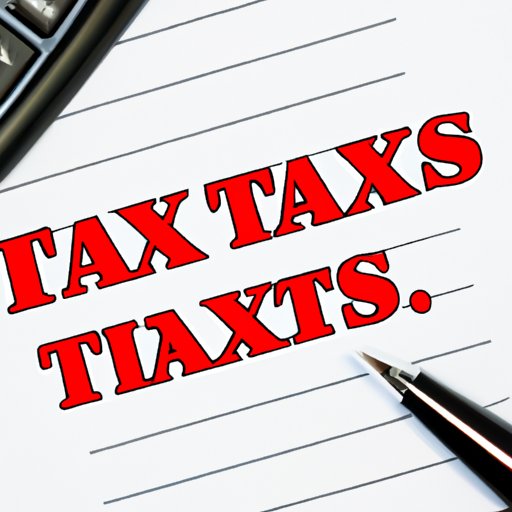
I. Introduction
Understanding sales tax and how to calculate it is essential for anyone who owns a business, makes purchases, or sells items. Sales tax is a state or local tax on retail transactions that is collected by the seller and required to be remitted to the government. In this guide, we will explore the ins and outs of sales tax, how to find it, and why it matters.
II. Overview of Sales Tax
Sales tax is a tax on goods and services purchased by the end consumer. It is typically calculated as a percentage of the purchase price and collected by the seller at the time of the transaction. Sales tax is an important source of revenue for state and local governments and is used to fund public services and infrastructure.
There are several types of transactions that may be subject to sales tax, including:
- Retail sales of tangible personal property (clothing, electronics, furniture, etc.)
- Sales of taxable services (lawn care, dry cleaning, car wash, etc.)
- Rental of tangible personal property (cars, equipment, etc.)
- Sales of digital goods (music, movies, eBooks, etc.)
When it comes to identifying sales tax rates and understanding sales tax laws, it is important to note that they vary by state and locality. Sales tax rates typically range from 4-10% of the purchase price, depending on the location and the types of goods or services being sold.
III. State-by-State Guide
Each state has its own tax laws and regulations, which can make it challenging to navigate. Fortunately, most states provide resources for individuals and businesses seeking to calculate and remit sales tax.
State tax agencies can provide guidance on sales tax laws, including how to file sales and use tax returns, what goods and services are taxable, and how to calculate sales tax on different types of transactions. Here are some tips for finding sales tax information:
- Visit the state’s tax agency website, which will typically have detailed information on sales tax rates, filing deadlines, and other requirements.
- Contact the state tax agency by phone or email for assistance. Many states offer online chat services as well.
- Ask a tax professional or accountant for guidance, particularly if you are unsure about sales tax laws or strategies for minimizing your sales tax liability.
It is also important to note that sales tax laws can vary by locality, so be sure to check with your city or county government if applicable.
IV. Tax Software Reviews
For small business owners and individuals who frequently make purchases or sales, tax software can be a valuable tool for calculating sales tax. There are several types of software available, ranging from free online calculators to more advanced tools that integrate with accounting software.
Here are some factors to consider when choosing tax software:
- Accuracy – the software should accurately calculate sales tax based on the applicable rates and regulations
- Ease of use – the software should be easy to navigate, even for individuals with limited accounting experience
- Integration – the software should integrate with other accounting tools you are using, such as Quickbooks or Xero
- Cost – the software should be affordable and provide a good value for its features
Some popular tax software tools include:
- AvaTax by Avalara
- Sales Tax Automation by TaxJar
- Sales Tax Manager by Taxify
- Vertex Cloud Indirect Tax
- CFS Tax Software
Ultimately, the software you choose will depend on your specific needs and budget. Be sure to read reviews and compare features of different options before making a decision.
V. Expert Q&A
We interviewed a tax expert to get insights on common questions and misconceptions when it comes to calculating sales tax.
Q: What are some common mistakes people make when calculating sales tax?
A: One common error is not factoring in local taxes, which can be significant in some areas. Another mistake is not understanding what types of goods or services are taxable in their state.
Q: What are some resources people can use to stay informed on sales tax laws?
A: State tax agency websites are a great resource, as are trade organizations and accounting firms that specialize in sales tax. It’s also a good idea to regularly review your state’s tax code and regulations.
Q: How can individuals and businesses avoid penalties for noncompliance?
A: The best way to avoid penalties is to maintain accurate records and documentation of sales tax collections and remittances. It is also important to stay up-to-date on changing laws and regulations, and seek professional advice if needed.
VI. Best Practices for Finding Sales Tax Information
Whether you are a small business owner or an individual making purchases, there are some best practices to follow when it comes to finding and calculating sales tax.
Here are some tips:
- Keep detailed records of all transactions, including sales receipts and invoices
- Regularly review the tax laws and regulations in your state and local area
- Use tax software or consult with a tax professional to accurately calculate sales tax
- File and remit sales tax returns on time to avoid penalties
- When in doubt, seek professional advice or contact a state tax agency for assistance
VII. Infographic
To help readers better understand the steps involved in finding and calculating sales tax, we have created an infographic outlining the key points of this article. The infographic includes important data and statistics to illustrate the significance of sales tax, and a clear and easy-to-follow design that appeals to visual learners.
VIII. Conclusion
Knowing how to find sales tax is essential for anyone who owns a business, makes purchases, or sells items. By following the tips and strategies presented in this guide, you can avoid costly mistakes and stay compliant with sales tax laws. Whether you use tax software, consult with a professional, or do it yourself, staying informed and accurate is key to success.




